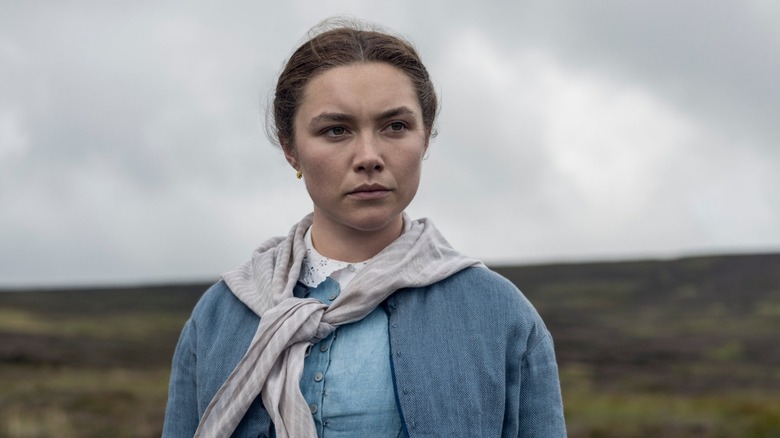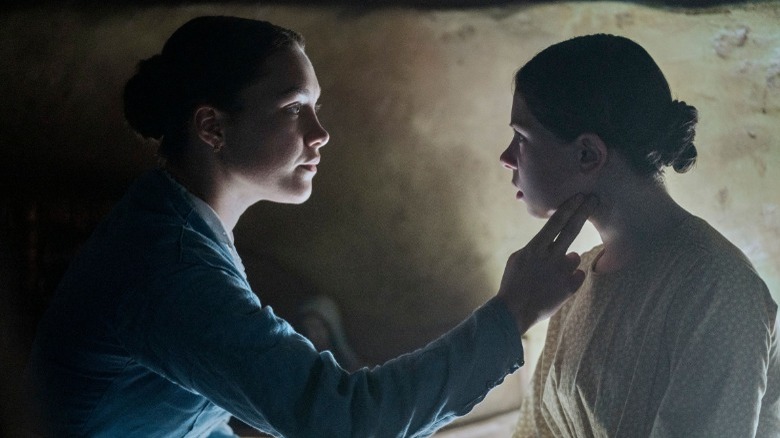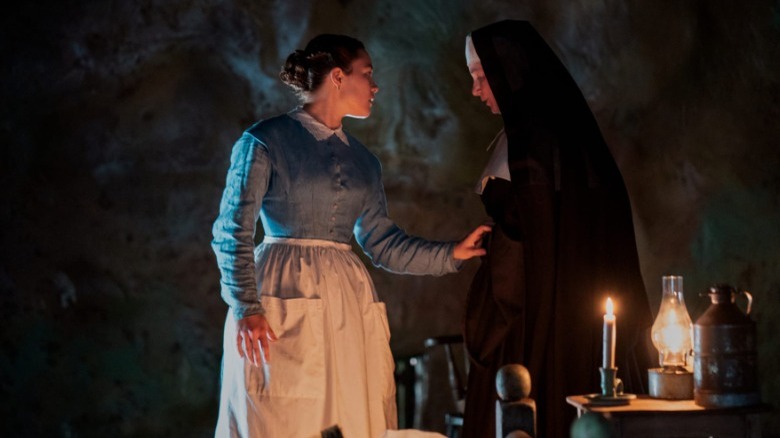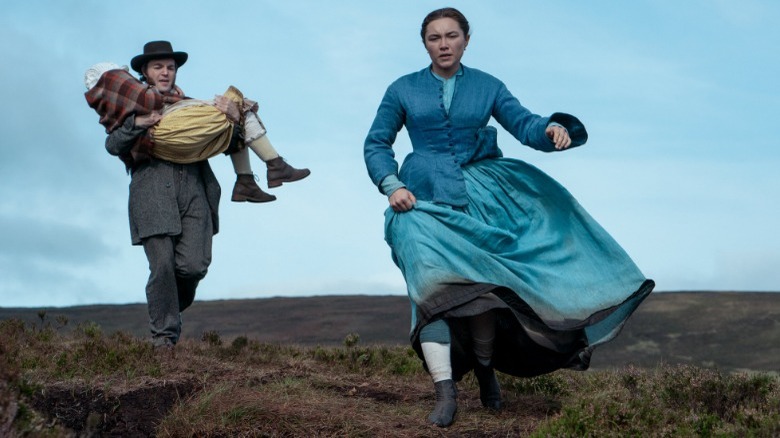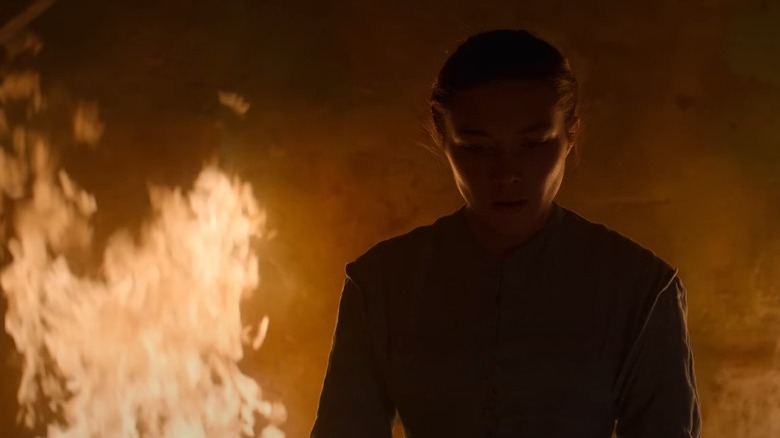The Wonder Ending Explained: Florence Pugh And A Fasting Girl
Sebastián Lelio's films have often dealt with the experiences of women on the edge or at a major crossroads in their lives (see also: "Gloria," "Disobedience"). His characters are challenged by present difficulties and past traumas that appear directly in front of them all at once, and Lelio uses every tool possible to fill his movies with their subjective view of events. In his 2022 film "The Wonder," based on Emma Donoghue's book of the same name, that subjectivity becomes a core question: How can one know the experience of another?
Elizabeth (Florence Pugh), or Lib, has a rational view of things. Because of that, her arrival in a provincial Irish village for the purpose of taking care of (and observing) a seemingly mystical phenomenon is practically designed to push her out of her comfort zone. The character served as a nurse in the Crimean War, surrounded by death on all sides, and is coming to an Ireland battered by the Great Famine just a decade prior. But this is something different: a young girl named Anna (Kila Lord Cassidy) who has not eaten in months and yet looks healthy. She is, in the parlance of the times, a "fasting girl," a 19th century phenomenon.
The conflict evolves into a thoughtful exploration of religion versus science and modernity versus tradition — an investigative story whose secrets unfold patiently to reveal both disturbing truths and hidden depths of kindness.
Arrival
However you might expect a period piece to open, "The Wonder" doesn't do that. There's no stormy arrival on Irish shores, no hint to the supernatural mystery driving the movie. Instead, it opens on a modern soundstage. This distancing effect is unique, and our Narrator (Niamh Algar, who also plays Anna's older sister Kitty) talks a bit about the movie we're about to see before the camera pushes into the fake ship that's transporting Elizabeth. The voiceover talks of the need for stories, and its stories that guide the movie: lies in the community, fiercely-held religious beliefs, the things family members tell each other to cast blame in the face of tragedy.
Restrictive production design and beautiful but oppressive landscape compositions tell the town's story. With the shadow of the Great Famine hanging over it, this story of a girl staving off starvation through miraculous means becomes especially poignant. And she's beginning to get attention.
Elizabeth's rationality and her drive to get to the bottom of things makes her an endearing character, as does Florence Pugh's subtle, reactive performance (and not just because the actor had to "fight the elements" to make the movie). But few people trust her, including Anna's superstitious family.
Elizabeth answers not to the family but to a council of strong-willed men in the community, a community where "everyone knows everyone." Sebastián Lelio frames the men together in precise compositions, all of them bickering and debating over the answers. What the council seeks is something like an objective truth instead of a "story," an answer for why Anna is fasting and yet living comfortably.
But beyond her wild story, Anna is just a normal girl.
Manna from Heaven
Religion, tradition, superstition, and ancient fears all collide with the strong determination of a young English nurse. Florence Pugh is as strong-willed here as she was in 2016's similarly chilly "Lady Macbeth," although significantly less cruel to children in this role.
This particular child has not eaten in four months, giving villagers the impression of a supernatural force. All she claims to consume is "manna from Heaven," the nightly kiss from her mother Rosaleen (Elaine Cassidy).
Is it God? Is it an increased sensitivity to magnetism, as suggested by Dr. McBrearty (Toby Jones)? Her last meal was on the occasion of her birthday, which fell on the same day of her first Communion. The last thing she ate was a Communion wafer.
Anna slowly burrows her way into a close relationship with Elizabeth, talking about nicknames with her (where they decide to call each other "Nan" and "Lib," respectively), as well as talking about where people go when they die. Elizabeth has a long-standing relationship with death –- as a nurse, it's part of her trade, and her role in the Crimean War has colored that relationship extensively. In response, Anna talks about how souls in Purgatory just need burn "a little bit," but souls in Hell need burn "forever."
Anna's older brother, who died of a mysterious illness not long ago and whose ghost haunts the movie, is one of those souls. The loss of his eternal soul has left everyone in his family guilt-striken, but none so much as Anna, whose mother has convinced her it's her fault. Elizabeth learns that Anna's fasting is penance, a sacrifice meant to preserve her brother's soul.
The truth
Elizabeth isn't the only skeptic in town. London-based journalist William Byrne (Tom Burke, who played the similarly troubled "The Souvenir" love interest) has arrived as well, one of many media personalities descending on the story in search of a fabrication. He has a rough history in Ireland –- his family was among the many who died during the Famine. He intimidates and attracts Elizabeth, who, despite going by Mrs. Wright, has not seen her husband in a long time, not since the death of their baby.
Because they are both alone, their bizarre relationship with Anna (and consequently each other) begins to take on the feeling of a makeshift family. While Byrne wants to expose the story as a fabrication, he disagrees with Elizabeth's new direct methods. She takes matters into her own hands, forbidding the family from interacting with Anna so she can observe what happens. The girl begins to grow weak, confirming Elizabeth's suspicions that Rosaleen has been sneaking her food, by chewing it up and spitting into her mouth during their nightly kiss – her "manna from Heaven."
Byrne's idea for a title for his article is "Murder by Degrees," telling Elizabeth that her search for the truth is slowly killing the girl they've both come to care for. Elizabeth waits for the right moment to confront Anna, to get her to tell the truth, and she does: Her mother has been feeding her, and her brother had been molesting her before he fell ill, causing the family to blame her for his sickness, as a divine retribution.
The saint
It's in this final stretch that the movie's themes of identity, religion, family, and storytelling collide.
Elizabeth hatches a plan with Byrne to save the now-dying Anna from her family, taking the young girl to a holy well and telling her that she's dying. Once she dies, Elizabeth says, she will wake up as a new girl who can eat: Nan.
With Nan on the way to Dublin with Byrne, Elizabeth decides to fake the girl's death, setting her bedroom on fire and causing the whole cottage to burn down. As she sets fire to the family's home, Elizabeth causes Anna's religious memorabilia and bibles to burn. It's one of the most cathartic movie fires since the ending of the Florence Pugh-starring "Midsommar," freeing Anna from the lingering shackles of her upbringing. And Elizabeth is able to come to terms with her own past as well, accidentally setting her arms on fire in the process.
Let go by the council without pay and all but accused of killing Anna, Elizabeth travels to Dublin, reuniting with her lover and with Nan. They depart for Sydney under new names. New identities, new stories. The villagers will never know the real story of Anna, neither her reason for starving herself nor her narrow escape. But Byrne's published article lays the blame squarely at the feet of the community, suggesting that real miracles (or "wonders") come from giving children adequate love.
The movie's final moments take us back to the soundstage, as if to suggest the narrative constraints of the film. The mostly happy ending here was well-earned, without a false note. But what's to be made of real-world cases like Anna's, of stories built to mask even more unsettling truths?
